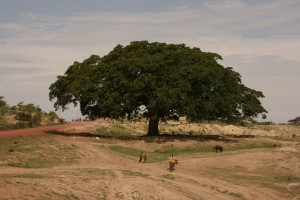(19)
“Behaving justly is more important than rituals.”
I certainly cannot claim to know that much about the minor prophets in the Bible although for reasons I cannot fathom, we did name each of our three sons after one of them. Perhaps it was a way to honor our ancestors, to quietly imbue in our offspring some ancient teaching that we’ve all but forgotten. We liked the sound of their names – that much was clear – and there was an ease that seemed to emerge shortly after their births that felt right. I don’t recall dwelling on any deeper meaning behind their names nor did we intend to place any burden on them related to any symbolism.
* * *
Amos was not one of the names we chose, but it might have been on the list if we’d spent any time looking into this remarkable, seemingly ordinary man who spent much time among the sycamore trees amidst what he saw was an increasing imbalance in every day Jewish life.
It was Amos who talked about the importance of behavior in society over the significance of religious rites or ritual. In the 8th century B.C., when the Middle East was in turmoil, and the right to occupy land was at the heart of conflict, it was Amos who dared to suggest that God might not always be on Israel’s side.
Amos was not prophesying in the sense we think of predicting the future but rather speaking from the perspective of a moral high ground, insisting that God’s top priority was caring for the vulnerable of society. In particular, he pointed to suffering that was the consequence of other people’s greed — insisting that what was most important was a just world. Amos reminded his country that it was never wrong to be on the side of the oppressed and that this was far more important than ones beliefs or religious rites in practice. What mattered was behavior and action.
* * *
Listening to Pope Francis’ message, I’m amazed that the teachings of the Catholic church have begun to inspire legions of people as they question the role of consumerism on suffering, our impact on the environment through wasteful actions and attention to profit, and compassion for those different than ourselves. The Pope minces no words when he calls capitalism in the developed world “an economy that kills.” Many devout Christians take issue with the Pontiff’s commentary on climate change (“he’s not a scientist”) but he is unrelenting when he asks “Do we realize that that system has imposed the mentality of profit at any price, with no concern for social exclusion or the destruction of nature?”
Strangest of all is the widespread, homophobic reaction to his acceptance of same sex love, demonstrating an unusual willingness to open his heart in discussions of so many matters in contemporary society. Though he encourages his bishops to “avoid political and ideological trends”, Pope Francis seems unable to resist posing for selfies with kids before offering commentary on climate change in his weekly Mass.
Now he’s proclaimed that bishops of the church may hear confessions from women who’ve undergone abortions – “to absolve of the sin of abortion those who have procured it and who, with contrite heart, seek forgiveness for it.” Yes, confession is indeed a “ritual”, yet Francis has put forward a deeply meaningful practice for believers who previously felt forever outcast from the moral teachings of their chosen religion. Maybe that can be counted as the Pope acting in a way that is “behaving justly” and embraces the oppressed.
* * *
Both the prophet Amos and Pope Francis came from humble beginnings – one, an ordinary shepherd and farmer, the other a janitor and bar bouncer. Both began early in their lives to question the standard religious, political and power establishment of their time. While many politicians and priests blindly praise those in power and accept the status quo of the system – justifying the ways of the ruling class – both Amos and Francis were sharply critical of the system itself mostly due to what they saw as its moral bankruptcy.
Maybe these are early signs of grass roots revolutions – demands for social justice so prevalent today as we seek to defend the oppressed and reexamine the gross inequity of our world. To me, it all comes down to the place where activism meets compassion for all sentient beings, discovering how we each behave as individuals and collectively and if we will indeed chose to care for the needs of the oppressed through the actions we take.
